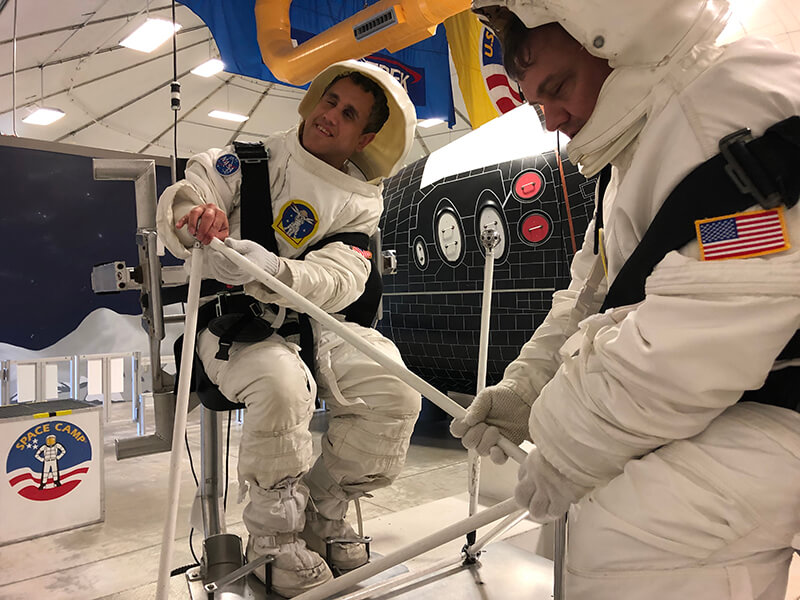September 8, 2020
ISLAND conference to focus on STEM access for all learners

Cary Supalo, ISLAND conference organizer and blind chemist, and Dan Barrett of Houghton-Mifflin Harcourt, perform an extravehicular task during ISLAND 2019 accessible pre-conference activities at the U.S. Space and Rocket Center Museum. (Image provided)
WEST LAFAYETTE, Ind. - A global conference designed to help to shift the paradigm of science access for all learners is making changes this year due to the pandemic.
Since 2010, the Inclusion in Science Learning A New Direction (ISLAND) conference on disability and STEM has provided a forum to address how persons with disabilities can be integrated more fully into science, technology, engineering and mathematics.
Due to COVID-19, the 11th annual ISLAND conference is going virtual on Saturday (Sept. 12). ISLAND is organized by Independence Science, a Purdue University-affiliated company, and is hosted at Princeton University.
Cary Supalo, a blind scientist and Purdue alumnus, founded Independence Science. It is based in Purdue Research Park. Supalo also founded the ISLAND conference.
“The ISLAND conference serves as a forum for access technology developers, science educators, rehabilitation professionals and educational researchers to network and share their experiences with how they have promoted the inclusion of persons with disabilities into STEM fields of study,” Supalo said.
The conference is sponsored in part by Princeton University Office of Technology, Princeton Center for Complex Materials and the Princeton University Campus Conversations on Identities. The Journal of Science Education for Students with Disabilities (JSESD) publishes papers based on the presentations of the ISLAND conference.
Questions can be emailed to the conference organizers at island@princeton.edu.
About Independence Science
Independence Science is an access technology pioneer dedicated to changing how blind people view their own capabilities about pursuing scientific careers as well as helping to educate the sighted scientific community that blind persons can make significant contributions to the STEM fields. Where before blind students and scientists only had sighted assistants available to them, Independence Science is helping the blind reclaim their laboratory independence. Through real inclusion and access to scientific laboratories, Independence Science is evolving the way society views science accessibility and helping blind students and scientists become more successful and equal participants within the scientific community. Interested persons and organizations can contact Independence Science at info@independencescience.com.
About Purdue Research Foundation
The Purdue Research Foundation is a private, nonprofit foundation created to advance the mission of Purdue University. Established in 1930, the foundation accepts gifts; administers trusts; funds scholarships and grants; acquires property; protects Purdue's intellectual property; and promotes entrepreneurial activities on behalf of Purdue. The foundation manages the Purdue Foundry, Purdue Office of Technology Commercialization, Purdue Research Park, Purdue Technology Centers and University Development Office. In 2020, the IPWatchdog Institute ranked Purdue third nationally in startup creation and in the top 20 for patents. The foundation received the 2019 Innovation and Economic Prosperity Universities Award for Place from the Association of Public and Land-grant Universities. For more information on licensing a Purdue innovation, contact the Purdue Office of Technology Commercialization at otcip@prf.org. For more information about involvement and investment opportunities in startups based on a Purdue innovation, contact the Purdue Foundry at foundry@prf.org. For more information about setting up a presence at Purdue, possibly in the Purdue Research Park or Discovery Park District, contact the PRF Economic Development Office at parksinfo@prf.org.
Writer: Chris Adam, cladam@prf.org
Source: Cary Supalo, island@princeton.edu

